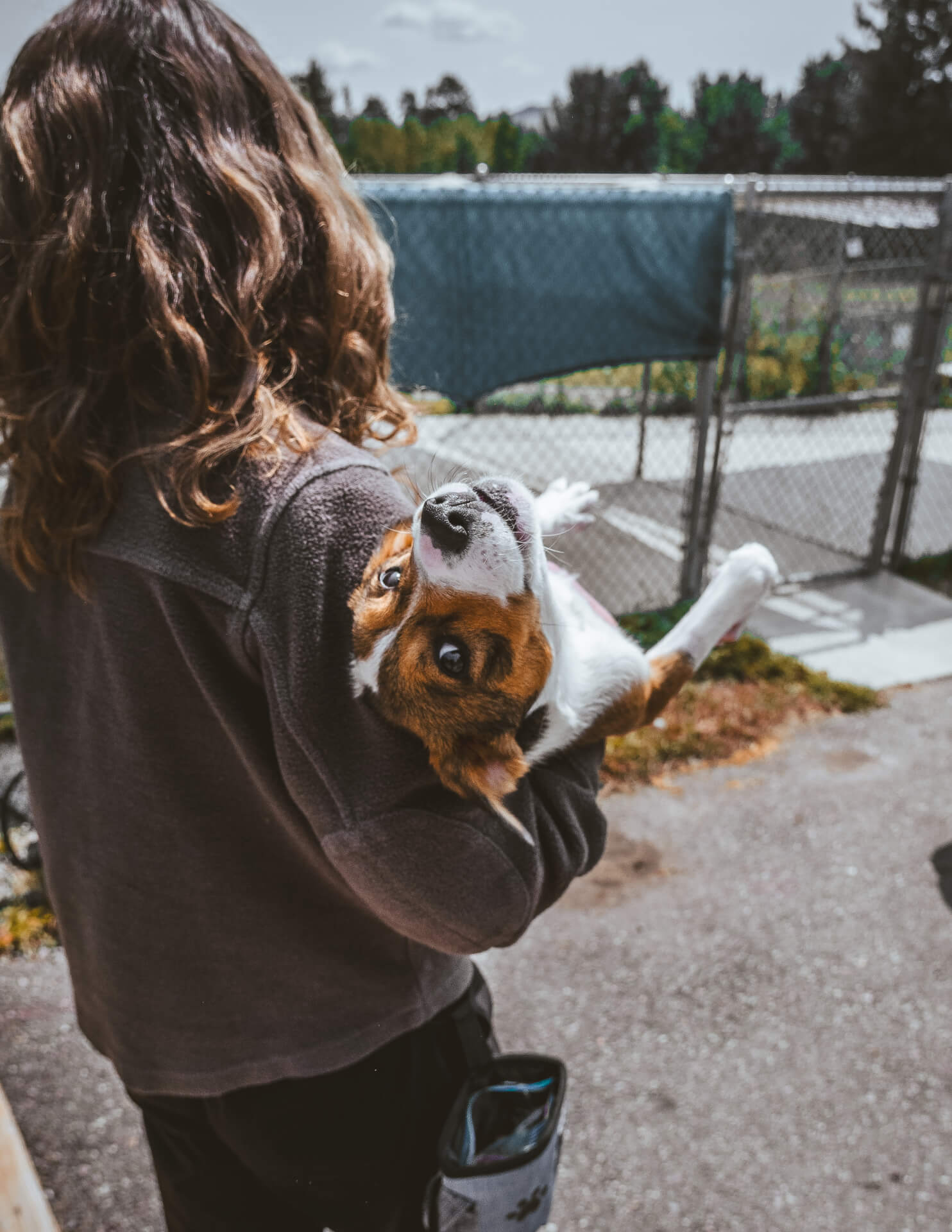
Housetraining Your Puppy
There are four basic components to housetraining; maintaining a schedule, supervision, crating or penning when unsupervised, and rewarding your puppy for eliminating in the right place. Crate training is a very valuable tool for housetraining your puppy and protecting them, and your home, from accidents and damage. Follow these suggestions and your puppy will be housetrained before you know it! If your work schedule or lifestyle doesn’t allow you to follow these recommendations and you do not have outside help, then an older puppy or adult dog might be a better fit for your family.
Establish A Routine
- Provide your puppy with bathroom breaks at the same time every day and feed them at the same time every day. This will help you to better anticipate when your puppy needs to go outside as puppies almost always eliminate in a set amount of time after they eat or drink!
- A general schedule would include a bathroom break first thing in the morning, after every meal or snack, after a nap or rowdy play session, and right before bed time. In general, a pup can only hold it for their age in months, plus one, in hours. For example, a two month old puppy can hold it for about three hours. A general guideline for an eight-week-old puppy is that they will need to potty 20 minutes after drinking a sizable amount of water, 30-45 minutes after eating a meal, and 15 minutes into a play session.
- Choose a specific location to be your puppy’s bathroom and take them directly to that spot, on leash, to eliminate. It is important for your puppy to practice pottying on leash, even if you have a fenced yard, so that they will be comfortable eliminating on walks or when you travel. Leashing your puppy also prevents them from wandering off to chew on sticks, digs, or focus on other things than the “task at hand.” You want your puppy’s potty spot to be close to the door and of an absorbent surface as most dogs do not like to eliminate on non-porous surfaces like cement. Stay within a 15 foot radius and allow them time to sniff, but do not allow them to pull you out of their pottying area.
- Only remain in the bathroom location for about 5-7 minutes. If they do not eliminate during that time, return indoors and either crate or supervise them closely until you go out again (15 to 20 minutes later). You want them to learn to go as soon as they get outside as opposed to holding it for the opportunity to go on a pleasant sniffy walk around the yard or neighborhood.
- Remember, puppies under four months of age often need to pee and poop twice every time they go to the bathroom. After your young puppy eliminates the first time, wait about two more minutes before going inside to ensure they are completely empty.
Supervise Your Puppy
- Actively supervise your puppy when they are exploring your home. Shut doors to rooms that you cannot directly supervise, particularly those with soft, porous surfaces like carpeting.
- Consider the use of a tether, baby-gates, or an ex-pen. This way your new puppy will not be able to wander around the corner and eliminate when you turn your back for a moment.
- Watch for signs that your puppy needs to go! These include sniffing, circling, pacing, and walking towards the door, especially when focused in a corner or when the puppy had been resting or engaged in an enjoyable activity previously, like play. Be sure to take them out when you see these signs!
- If your puppy is sneaking away to another room to have accidents, decrease the amount of space they have access to. Accidents with puppies are due to a lapse in supervision or forgetting a bathroom break. Your young pup won’t understand how to tell you they need to go out so it is your job to create a schedule to set them up to succeed.
Confine Your Puppy When Home Alone
- Giving your puppy too much access can lead to problems. Restrict your puppy to an ex-pen in a room that has been puppy-proofed or crate train them for times when they cannot be supervised.
- Crate training is very helpful because dogs naturally do not want to eliminate where they sleep. By crating your puppy when they aren’t supervised, they will learn to hold it until you provide access to the appropriate bathroom space. Again, your puppy can only hold it for, at most, their age in months plus one in hours (a two month old puppy can be in their crate for three hours).
Reward Your Puppy For Going In The Right Place
- If your puppy urinates on the carpet, they get relief. If they urinate outside, they get relief. So where does the desire to go outside come from? You! Right after your puppy eliminates in the correct spot, provide her with a high-value, tasty treat and ample praise. However, do not begin praising your puppy until they are completely finished with their elimination (for instance, when coming out of their squat). Premature praise may interrupt them, leading to a partially-full bladder when you return indoors, making them ripe for an accident! Your puppy may also learn to only partially eliminate in order to get their tasty reward faster.
- While they are eliminating or when they are about to eliminate, calmly say a cue such as “go potty”. Over time they will learn what this means and it will be helpful during inclement weather or when traveling!
- Play a quick game of fetch or tug-of-war or walk around the yard/block with them before returning inside. You don’t want them to learn that going to the bathroom ends the fun outdoors or else they may not eliminate as soon as they go out.
What To Do When They Do Have An Accident
- Clean the stain thoroughly with an enzyme-based pet specific cleaner found at any local pet store. Follow the directions on the label. Non-enzymatic cleaners may not thoroughly remove the smell of urine or feces, and if cleaned improperly, your puppy may think the spot is the place they are expected to go just because they have used it previously!
- Increase your supervision and consider the use of a housetraining log to determine patterns in accidents to make adjustments to your supervision or their bathroom break schedule.
- Do not use punishment or scold your puppy for accidents! If you rub your puppy’s nose in their urine, they don’t understand that your anger stems from the accident. They associate your anger with your approach and begin to posture in an appeasing way to avoid punishment; this is misinterpreted as a “guilty look.” If you catch them in the act and scold them, they are likely to believe they are in the wrong for eliminating in front of you, not indoors. Instead of learning the right place to go they are likely to avoid going in front of you. This is likely to make housetraining even more difficult and become a real problem when you need them to go on leash in the future!
- If your puppy has been on the right track to housetraining and suddenly starts to have accidents, schedule a visit to your veterinarian. If there is an underlying medical cause for your puppy to have accidents no amount of training will fix it without first resolving any medical issues.
